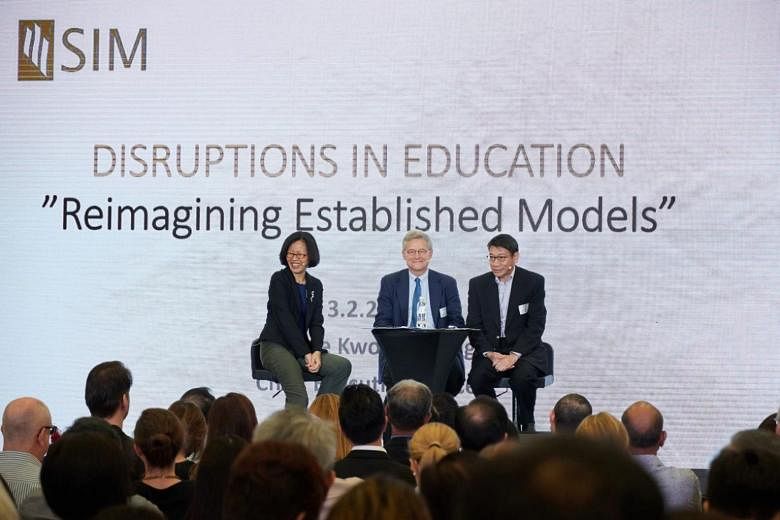SINGAPORE - Universities around the world are having tough conversations on how to deal with challenges in education , but changes will take time, said two seasoned education administators on Saturday (Feb 3).
There are hurdles in changing traditional methods of teaching, but more institutions are rethinking the way their students are learning, said SIM Holdings chief executive Lee Kwok Cheong at a panel discussion on Saturday (Feb 3).
The forum - Disruptions in Education (DisruptED) - was co-organised by The Straits Times and the Singapore Institute of Management.
Technology is changing the way people gather information, said Mr Lee, citing the example of working adults choosing topics they want to learn from the wide range of courses offered by online education platform Coursera.
"Universities do innovate, they do make a lot of internal changes, and they do try to stay relevant," he said.
Universities are here to stay, but Mr Lee raised the reality that they are slow-moving, costly to run and subject to external regulators.
"Any university that wants to make big changes, typically you have long debates and objections from faculty and alumni,"he said.
Sharing Mr Lee's view, Dr Charles Zukoski, provost for the University of Buffalo, New York, said that faculty members - who are often resistant to change - have to reshape their teaching to cater to a new generation of students, many of whom are digital natives.
While the desire for higher education has never been stronger, costs of running traditional four-year degree programmes - developed in the 19th century - are going up, he said.
"We're now in the 21st century... Now we're talking about expanding education to a larger fraction of the population," said Dr Zukoski, who is also executive vice-president for academic affairs at the University of Buffalo.

He foresees alternative forms of education being offered to cater to demand, such as shorter degrees or other types of credentials.
And as jobs get disrupted and redefined, the kind of skills that employers look for are changing, and schools need to prepare students for this.
For instance, students will need to learn more skills in communication, study more about culture and history, and have more experiences out of classrooms, said Dr Zukoski.
He cited the example of law students at the University of Buffalo who are posted to local hospitals to speak to families. The initiative trains them to respond to real-life problems, instead of answering model legal questions, he said.


